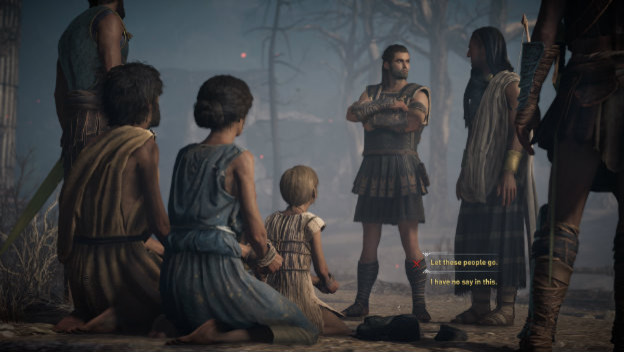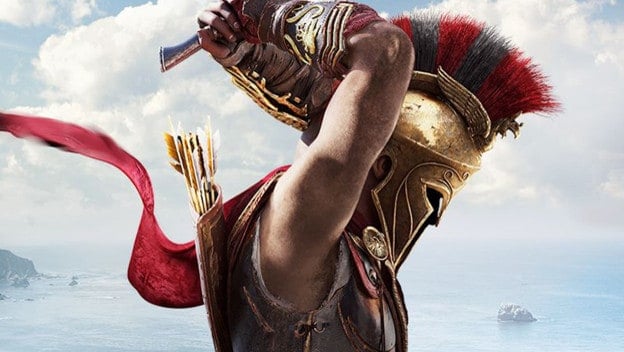At a 2018 San Francisco preview event for Assassin’s Creed: Odyssey , CheatCC had a chance to hear about what it is like for the series’ storytelling structure to travel in a big, new direction. Helping me get more perspective on what that means was Mel MacCoubrey, the Narrative Director on Assassin’s Creed: Odyssey. S he told me about the writing process on the game, what it’s like to bring choice and multiple endings to Assassin’s Creed for the first time, and even provided a little insight into what goes into maintaining the series lore and how that goes into mediums outside of video games. It’s good stuff, I promise.
CheatCC: So! You’re the Narrative Director. Can you tell us what that means?
Mel MacCoubrey: I work very closely with the creative director and the game director to establish the overall vision of the story, how it’s gonna fit and be cohesive with the rest of the game, and I work with the team of about 23 writers now across multiple studios to help bring the story to life. They do all the hard work to bring it up and it’s a really exciting job, and I really love it.
CCC: Wow, with over 20 people in different locations I imagine there are a lot of remote writing meetings, things like that?
MacCoubrey: Yeah, with the Singapore team and their 12 hour time difference, you end up with a 7am/7pm meeting, but we make it work. I love the Singapore team, they’re great.
CCC: Usually, people just think there’s a bunch of writers in a single room!
MacCoubrey: We try and get as many in one room as possible, but when you divide up game mandates and stuff, a lot of time it calls for having co-dev studios. It’s really exciting to work with studios around the world, because they really bring different perspectives to the game experience. The stories that everybody tells, whether it’s in Quebec or Montreal, or Singapore—they’re all giving you a different look at Greek life and Greek culture—they’re all pretty exciting!
CCC: Can you talk about the setting, as far as what you’re trying to do with it?
MacCoubrey: Ancient Greece [laughs].
CCC: Sure, it’s a popular setting though, right?
MacCoubrey: I think it has weight in pop culture, which is maybe why it feels like it’s a popular setting. I think it also feels like it’s a popular setting because a lot of what we know today in western culture comes from Ancient Greece—people had cool ideas in Ancient Greece!
That has been a really interesting line for us to walk. What do people know or what do people think they know? What can we contribute that people don’t already know? What are the true stories behind things like the Achilles Heel; “strong like Hercules?” What can we bring to the table that maybe people aren’t so much aware of, in a way that is grounded in the Ancient Greek culture and also believable? Sometimes you get pop culture ideas that kind of distort that vision of what the reality was. Not everybody is Gerard Butler [laughs]
CCC: Are you getting asked a lot about that because of the opening?
MacCoubrey: Oh no. No, which is nice.
CCC: Ha, yeah, I won’t bother you with that either. Note: 300 is lame. Sorry, we don’t make the rules.
MacCoubrey: I think if you watch 300 or something, and you go to a game about Ancient Greece like, “Is it this?” when there’s so much more to explore…
CCC: Absolutely. Considering that kind of mindset, can you pretend I have no idea what any of this is, and give me the pitch on what the goal is with Assassin’s Creed: Odyssey ?
MacCoubrey: Assassin’s Creed: Odyssey— set in Ancient Greece in 431 BC, which if you have played Assassin’s Creed in the past, is approximately 400 years before Origins— is the newest installment in the Assassin’s Creed franchise. But, we are bringing some new elements to it that I think make this older franchise feel fresh, new, and inviting for people who may not have had the chance to play Assassin’s Creed or may have been intimidated by Assassin’s Creed in the past. We have the element of choice at the center of our game, which I think really helps us with that experience.
We found that when we were putting this game together, that everybody kind of plays Assassin’s Creed a different way. This makes it a really cool opportunity to invite new people in, because we’re giving you the choice to play the way you wanna play, to make the choices that you wanna make, and to be the character that you wanna be. So if you’re new to this franchise, you can immerse yourself in the story as much as possible, follow the story of Kassandra and Alexios, make the choices that will define your Odyssey, and come on an adventure with us.
CCC: Speaking of those characters, are they different characters as far as the story goes?
MacCoubrey: They are the same character. They have different names, but they are the same character and it’s really the choices that you make as a player that will define your experience. The actors bring their own little twists, they play them a little bit differently, but they are the same person.
CCC: Earlier you mentioned Assassin’s Creed: Odyssey takes place before Origins (the previous release). Does the modern day content take place after?
MacCoubrey: Yes.
CCC: So when you’re going in opposite directions in a manner of speaking, do you have to take extra care when creating the story?
MacCoubrey: As we’re continuing the story of Layla, you really wanna make sure you know what happened in the previous game before you continue her story, because obviously she is an established character. She’s made decisions, she’s met certain people, and she’s done different things that we need to be aware of when we’re writing the next part of her saga. But in terms of where she goes, which memories she follows and what period of time, as long as everybody’s cool with what happens in those enclosed stories, then it doesn’t really matter that we’re in one period then jumping to another one.
CCC: Something I’m curious about, especially with Assassin’s Creed , there are a lot of supplemental materials: comics, novels, so on and so forth. How does making those intersect with making the games? Are you or your team involved?
MacCoubrey: It depends on what part of the trans-media you’re talking about. We have a brand team that oversees a lot of the trans-media. Our lore is really huge, so you have to be on top of your stuff, whatever part of the media you’re in. If you’re in game, in comic books, in novels, you have to know what’s going on, especially if there are elements that touch other things that have happened. You know, every game kind of opens new doors, so you have to be careful you’re not accidentally contradicting another game.
If the trans-media is directly related to a game we’re making, then we’re involved with it more than otherwise. We have a really cool relationship with the fans – they keep up a wiki as well, of all of the lore and stuff, and that has been very helpful, I know, for a lot of devs on a lot of games to make sure we keep everything straight, as well as having our own internal stuff.
The one example I could give is, I did work really closely with the author for the Odyssey novel to make sure, because it’s going to be a linear retelling of the game, that we, because this is a choice-based game and it’s so huge, that if you’re going to write a book which is a linear way of telling a story (unless you’re doing a choose your own adventure which it isn’t), we make sure that the characters are as accurately represented as possible, that we’re okay with whatever line the author wants to choose. We’re all under the same umbrella of knowledge, but not everybody has all their fingers in all the pies.

CCC: One thing I noticed when I was playing, Assassin’s Creed: Odyssey seems a little more jokey compared to previous games in the series.
MacCoubrey: We definitely wanted to include a wider variety of tone in this game, mostly because Ancient Greek culture, the inspiration we got from that from the histories, from the plays that were written to the myths and stuff, all of them are very larger than life and they touch on a lot of different genres (tragedies, comedies, etcetera, you know), and we wanted to best represent that, and we needed to have a lot of different tones.
The personal story that you haven’t quite hit is based on the model of the Greek tragedy, and I find that in a lot of games the main story can take itself a little too seriously, so to counter-balance that seriousness and that tragedy that comes with the story and that personal drive, motivation, you need to have people connect to your story and your protagonists, and to counter-balance that we have different kinds of tones you’re gonna find in the game. Kefalonia is, yes, a little strange and out of the box, and I love some of those characters for that. But expect to find a lot in your playthrough.
CCC: So we have two versions of the same character, and tons of choices you’re making throughout Assassin’s Creed: Odyssey . How do you strike a balance telling a story considering all these little, moving parts?
MacCoubrey: We knew that we wanted to tell a personal story people would connect to. As we were developing that story, at a high level view, we started to figure out what beats we wanted to hit, we looked at the ancient epic in terms of how it’s structured, like how the Hero’s Journey is structured, and how it relates closely to an open world setting, because it’s very much an ancient epic in itself. We took a lot of inspiration from that in how to pace out what this story would look like, knowing that there were several points in the game where we wanted you to make big decisions that would alter the story dramatically. We started there, and built in the smaller choices after that so we could make sure we were building the different story arcs in a way that made sense, that all had their conclusions, and would all kind of come to a head at the end.
So you kind of start there, then you dig a little deeper and start to flesh it out as you go through so that you don’t end up with a game that’s so branching you can’t conclude it, like it’s too big and it becomes out of control, and you don’t end up with something that is way too linear and doesn’t give you any choice. So it’s a fairly fine balance, and it takes a lot of iteration, time, and work, and we were really lucky to get that. It makes for a really cool experience, having choice in an Assassin’s Creed for the first time, and being able to have multiple endings, and what that means for us because it’s a first.
